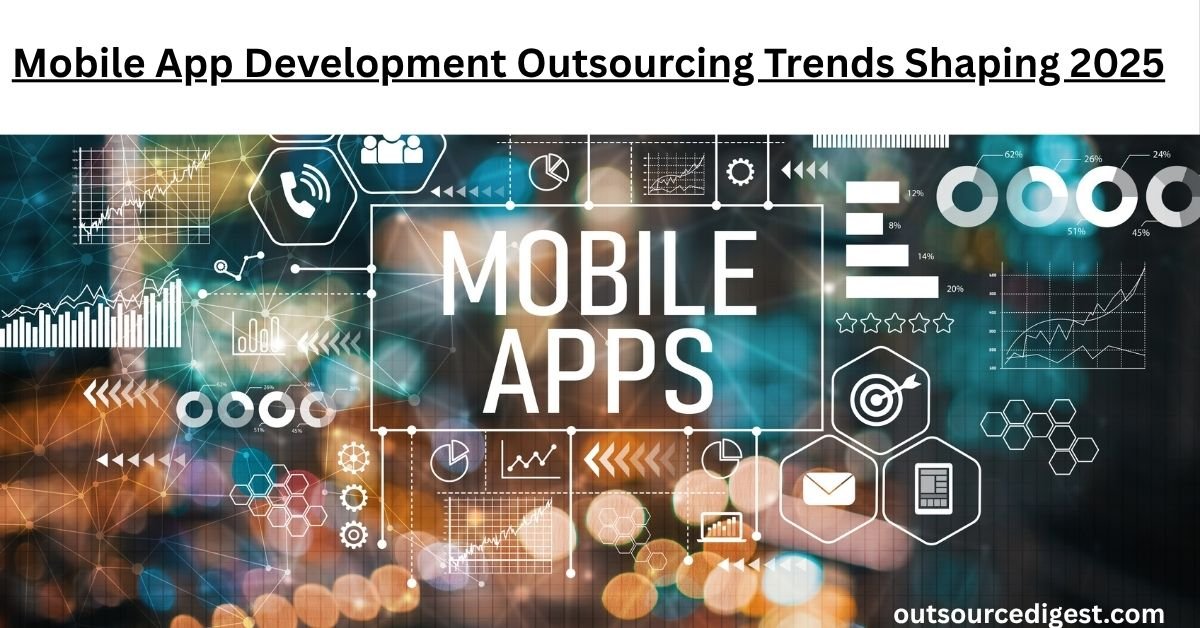Mobile apps are no longer optional for startups—they’re essential for survival. Yet, hiring in-house developers in the U.S. is costly, and competition for top talent is fierce. That’s why outsourcing has become the smarter choice for startups looking to launch and scale quickly.
- 1- AI-Driven App Development is Becoming the Norm
- 2- Nearshore Outsourcing is Overtaking Offshore
- 3- Agile Development and Dedicated Teams Are Standard
- 4- Security and Compliance Take Center Stage
- 5- Cross-Platform Development Continues to Dominate
- 6- Flexible Pricing Models Are on the Rise
- 7- Growing Popularity of Niche Specialists
- 8- Hybrid Outsourcing Models Gain Ground
- 9- Sustainability and Ethical Outsourcing Matter More
- 10- Continuous Support and Post-Launch Services Are Non-Negotiable
- Conclusion
But outsourcing in 2025 doesn’t look the same as it did five years ago. The industry has evolved with AI, nearshoring, new pricing models, and changing customer expectations. In this article, we’ll explore the key outsourcing trends shaping mobile app development in 2025, and what they mean for U.S. startups.
1- AI-Driven App Development is Becoming the Norm
Artificial intelligence is no longer just a buzzword—it’s transforming outsourcing.
- Automated coding tools help teams build apps faster.
- AI-powered testing ensures higher quality with fewer bugs.
- Predictive analytics allows startups to understand user behavior early.
Outsourcing partners that integrate AI into their workflows can deliver apps at a lower cost and with higher precision. Startups should look for vendors showcasing AI-based development practices.
2- Nearshore Outsourcing is Overtaking Offshore
Traditionally, U.S. startups outsourced to India or Southeast Asia for cost savings. In 2025, many are shifting to nearshore outsourcing in Latin America.
- Time zone overlap improves real-time collaboration.
- Cultural similarity reduces miscommunication.
- Rates are still affordable ($30–$50/hour).
Mexico, Brazil, and Colombia are now major players, attracting startups that need speed and efficiency without sacrificing quality.
👉 Still not sure which model suits your business best? Discover the key differences between Nearshore and Offshore Outsourcing in our 2025 expert guide.
3- Agile Development and Dedicated Teams Are Standard
Gone are the days when outsourcing meant a fixed-price project with minimal flexibility.
- Startups now prefer dedicated teams that work like an extension of their in-house staff.
- Agile sprints allow for iterative development and quick pivots.
- Collaboration tools like Jira, Slack, and Trello are now standard practice.
This shift makes outsourcing more dynamic and transparent, helping startups feel in control of development.
4- Security and Compliance Take Center Stage
With data privacy regulations tightening (GDPR, HIPAA, CCPA), outsourcing is no longer just about speed and cost.
- Startups in fintech, healthcare, and e-commerce demand secure coding practices.
- Vendors are investing in cybersecurity certifications and compliance audits.
- Contracts now include strict IP protection clauses.
Startups outsourcing in 2025 must ensure their partners follow industry security standards.
5- Cross-Platform Development Continues to Dominate
Building apps separately for iOS and Android is expensive. Startups increasingly request cross-platform frameworks like:
- Flutter (backed by Google, known for speed).
- React Native (popular with startups for scalability).
- Xamarin (still strong for enterprise apps).
Outsourcing partners specializing in cross-platform development help startups save time, money, and maintenance costs.
6- Flexible Pricing Models Are on the Rise
In 2025, startups are demanding pricing flexibility instead of rigid contracts.
- Time & Material for MVPs and evolving projects.
- Dedicated team models for scaling.
- Outcome-based pricing (paying for results rather than hours).
This trend aligns outsourcing costs with startup budgets, reducing risk while ensuring quality.
7- Growing Popularity of Niche Specialists
Instead of hiring generalist outsourcing firms, startups now prefer niche specialists:
- Fintech app developers with compliance knowledge.
- Healthcare app teams are familiar with HIPAA standards.
- E-commerce specialists with payment integration expertise.
This allows startups to get industry-specific expertise from day one.
8- Hybrid Outsourcing Models Gain Ground
Startups no longer see outsourcing as “all or nothing.” Many adopt hybrid outsourcing models:
- Core strategy handled in-house.
- Development outsourced to nearshore/offshore teams.
- QA, testing, or maintenance is outsourced separately.
This hybrid approach balances control, cost, and flexibility.
9- Sustainability and Ethical Outsourcing Matter More
In 2025, many startups want partners that align with their values:
- Vendors that follow sustainable practices.
- Companies promoting fair wages and diversity.
- Partners with transparent labor policies.
Ethical outsourcing isn’t just PR—it helps startups build stronger reputations with socially conscious customers.
10- Continuous Support and Post-Launch Services Are Non-Negotiable
Outsourcing no longer ends with app delivery. Startups expect:
- Ongoing bug fixing.
- Feature updates.
- Scalable cloud integration.
The best outsourcing partners in 2025 are those that commit to long-term app lifecycle management.
Conclusion
Mobile app development outsourcing in 2025 is about more than cutting costs. Startups need partners who offer AI-driven development, nearshore convenience, agile practices, niche expertise, and long-term support.
By keeping an eye on these trends, U.S. startups can choose outsourcing partners that not only build apps but also accelerate growth and reduce risk.

